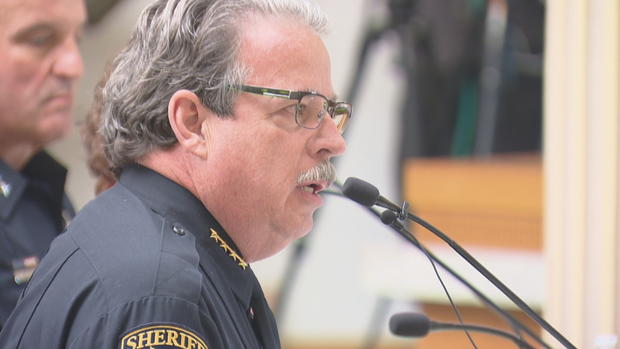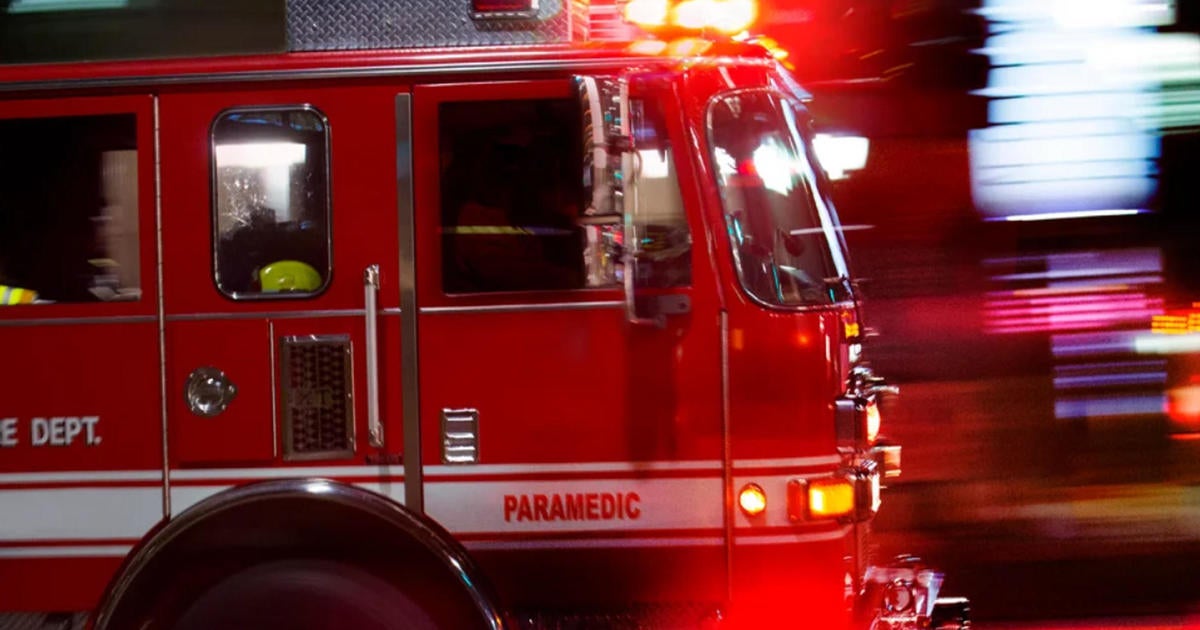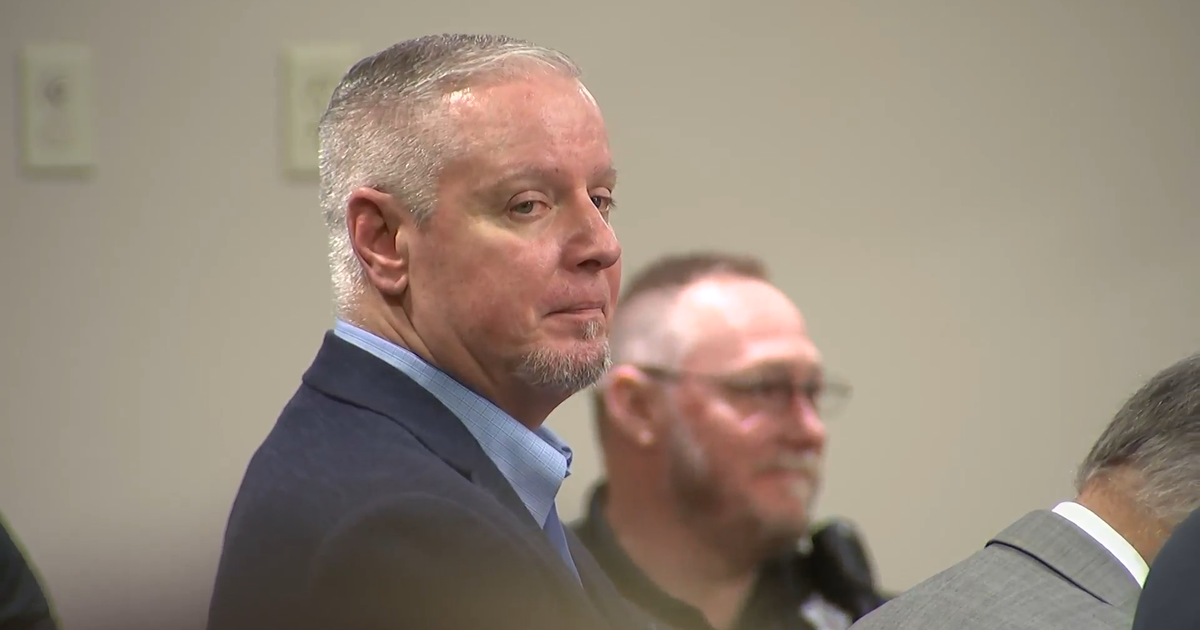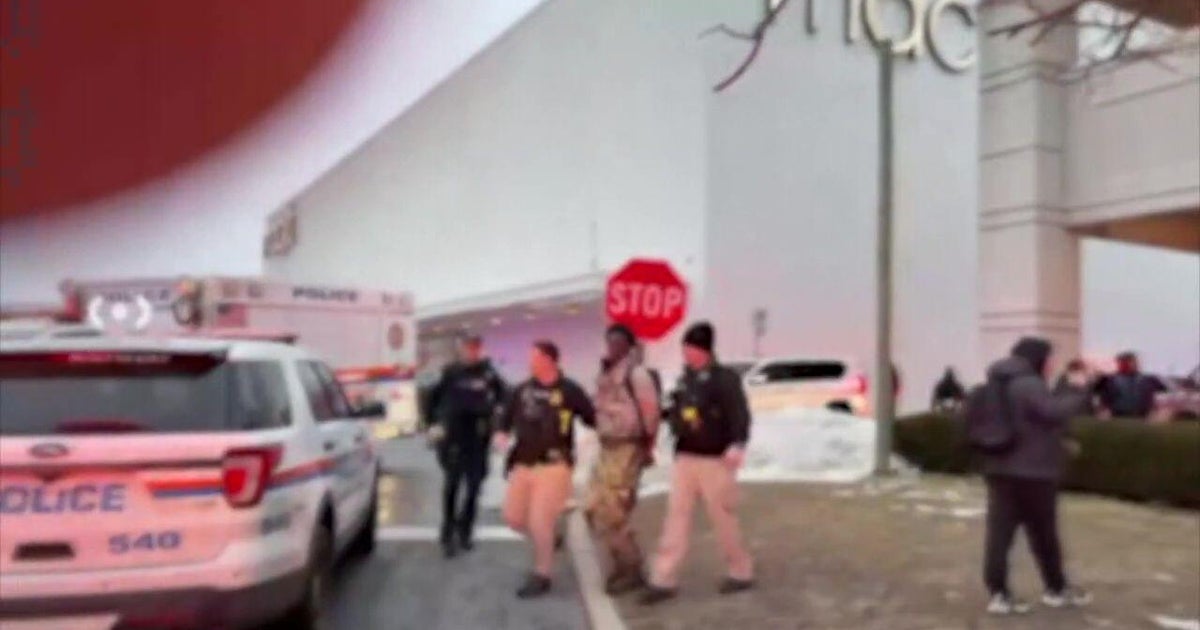A Look At Red Flag Laws And The Battle Over One In Colorado
(CBS NEWS/60 MINUTES) - Thursday, a high school in Santa Clarita, California, was the scene of the 366th mass shooting in America this year. Each seems to reignite the debate over gun legislation. In recent years, 17 states and the District of Columbia have adopted Red Flag laws which allow the confiscation of firearms if a gun owner raises a Red Flag with threatening behavior. California adopted Red Flag in 2016. And there's been a big movement toward the law recently with 12 states adopting it in the 21 months since the high school shooting in Parkland, Florida. Colorado is one of them but, in defiance, nearly half of the state's counties have declared themselves Second Amendment sanctuaries. Colorado's Red Flag law takes effect New Year's Day. The story of how it works and why it's fiercely debated begins with a tragedy on New Year's Eve, 2017.
Apartment 24 was a headache for Douglas County Sheriff's deputies in the suburbs of Denver. They'd met the resident, Matthew Riehl, before. With each dispatch, deputies were reminded Riehl was mentally ill, hostile and armed. He hadn't been violent, but that morning, he live streamed threats and talked of guns. Deputies believed Riehl was suffering a mental breakdown.
Riehl hadn't broken the law, so deputies could only take him into protective custody for a mental evaluation. Instead, Riehl barricaded himself. Deputy Zack Parrish hit the door.
In a 96-minute shootout, five officers were hit. Riehl's bullets flew through walls and wounded two neighbors.
Deputy Zack Parrish was killed, leaving a wife, a 4-year-old and an 18-month-old. Matt Riehl died with 19 legally-owned firearms, including assault rifles, a combat shotgun, and pistols. He had fired 185 rounds. He had 1,067 left.
Douglas County Sheriff Tony Spurlock: We had been dealing with this individual for almost two months. We had done a lot of things to try to intervene. But there were no tools available to us to do that.
The casualties Douglas County Sheriff Tony Spurlock suffered made him a leading advocate for the Red Flag law which allows law enforcement to ask a judge for "an extreme risk protection order." The order requires a gun owner to temporarily give up his weapons.
Scott Pelley of CBS News: If the extreme risk protective order had been available to you then do you think you would have asked for one?
Tony Spurlock: Probably a month before, we would've been able to intervene, and in my opinion, most likely would have saved two lives. We would've saved the suspect's lives and we would have saved Zack's life.
The Red Flag movement began after Sandy Hook Elementary School in 2012. Mental health experts and gun safety advocates wrote a model law which most of the Red Flag states adopted. Among the authors was Josh Horwitz, who leads the Coalition to Stop Gun Violence.
Josh Horwitz: This is a law that is a temporary civil restraining order that allows family members or law enforcement to go to a court and remove the most lethal means – a firearm – before a tragedy occurs. And if the judge agrees and issues the order, law enforcement will go and serve the order on the respondent, remove the firearms, and then somewhere between 7 and 21 days everybody will come back to court there'll be a full hearing. If the person, in fact, is dangerous to self or others, the firearms will be kept by law enforcement, and that person won't have access to them for a year.
In a recent Red Flag hearing in the state of Washington -- and as is the case with most Red Flag cases -- the police filed a sworn affidavit alleging threatening behavior by a gun owner. On the judge's order, weapons were taken into police custody and the gun owner was temporarily banned from buying another gun.
Josh Horwitz: They have the right to testify. They have the right to cross-examine witnesses. This is something with court rules, with rules of evidence, with judicial oversight, this is the kind of thing which is a thoughtful, well-developed process to intervene when it matters most.
The law requires the gun be returned to the owner in no more than one year. During that year, the owner can appeal. If there is still a concern at the end of the year, a judge can renew the order based on new evidence.
Scott Pelley: How does this law compare to the kind of temporary restraining orders that we see when a spouse is concerned about being beaten or killed by their loved one?
Josh Horwitz: In a domestic violence law, you can not only lose your firearm, but you can be prevented from going into your own home. You can be prevented from seeing your kids. What we're dealing with, Extreme Risk law, is very narrow. Get the firearm out of an explosive situation before it's too late.
Mark Dreher: If only we could have kept those guns away from him until he could grow up a little bit.
Mark Dreher knew about Red Flag laws, but Colorado didn't have one in 2017 when mental illness overwhelmed his son.
Chris Dreher's family, near Boulder, was devoted to his care—psychologists, psychiatrists, medication—but Chris was tortured by anxiety.
Mark Dreher: He worked at a place and he bought a pistol from one of his co-workers. His long-term psychologist said that he should not have any guns. Because he had suicidal ideation at that point. So we took em away, took it away and locked it up. But then he started telling me that well he could just go out and buy another one.
Scott Pelley: And so, you were faced with the reality that he could have a gun at any time he wanted one.
Mark Dreher: Yes I made a deal with him. I said, "I'll give you the guns back. But you have to let me put trigger locks on the guns, and I'll have the keys." And he found a way to get 'em off. And one night, you know, when he was having some issues he went to a place by his apartments. And he committed suicide that night.
Scott Pelley: How old was he?
Mark Dreher: 20.
Suicides, and memories of massacres including Columbine and the Aurora theater, pushed Colorado's Red Flag law forward against heavy resistance. The bill failed in the Republican Senate. Then it passed when voters gave both Houses to Democrats. Now, the law has become Colorado's political great divide.
Steve Wells: You've got the people that live in the city that has this idea that it is a good thing. But I think more importantly, this is a political issue where it's a vote getting issue.
Steve Wells' family has been ranching since 1888. He's among those who feel politically powerful cities are trying to corral the countryside.
Scott Pelley: So what's a better idea?
Steve Wells: Well, I think one of the things we really gotta start looking at is individual responsibility. If I have a family member, and I think for any reason that family member is going to be an issue with a firearm, we're going go take them away from him. We've become so dependent on government making all the answers for everybody.
Dozens of sheriffs in Colorado have dug in their heels, including El Paso County Sheriff Bill Elder and Weld County Sheriff Steve Reams.
Steve Reams: There are portions of the law I just flat out can't and won't do.
Scott Pelley: This is a law that was passed by the legislature. It's signed by the governor. Nobody asked you.
Steve Reams: That's right.
Scott Pelley: You're just expected to do your job. And enforcing the law is your job.
Steve Reams: Right. And I also take an oath of office that says, I'll support the U.S. Constitution, the Constitution of the state of Colorado and then, I'll enforce the laws of the state of Colorado. When those things are in conflict you know you have to decide which one you are going to adhere to.
Scott Pelley: Are you prepared to get locked up in your own jail?
Steve Reams: That is something that could happen. A judge could order me to my own jail. You know, I would be the one litigating that issue and we'll determine at that point if this Red Flag law is constitutional.
Opponents say Red Flag violates the right to bear arms, the right to due process and the right against unreasonable search and seizure. Some sheriffs say they won't ask for a Red Flag order and if they receive one from a judge, they won't enforce it.
Scott Pelley: If you decline to enforce one of these orders and people die, won't the county be liable for the damages?
Steve Reams: If law enforcement's only objective is to go take someone's firearms and that person still goes out and commits violence, do you think that we would then be off the hook for any damage that they would inflict? No, people would still look at law enforcement and say, "Why did you only take their guns? Why didn't you deal with the person?"
Bill Elder told CBS News the legislature aimed at the wrong target.
Bill Elder: We need to have funding for meaningful mental health assessments and treatment. There just are no programs. The state hospitals are full. The local hospitals are not equipped for it. Jails tend to be the warehousing for people in crisis.
Scott Pelley: Jails are the new asylums.
Bill Elder: I have 1,700 inmates. Anywhere from 50% to 60% of those inmates suffer from some form of mental health issue.
In protest of the law, nearly half of Colorado's 64 counties have declared themselves, symbolically, "Second Amendment sanctuaries." County commissioners passed a Second Amendment resolution even in the county that lost Zack Parrish, Tony Spurlock's deputy.
Scott Pelley: They do not agree with you.
Tony Spurlock: No they don't but I asked them, and they have yet to answer me this question, what does a Second Amendment sanctuary county mean? Does that mean everybody gets to carry a gun? Those who already have restraining orders? The sex offender that's registered down the street here from my office? It's a clever term. But it literally means nothing. The laws of the state of Colorado and the United States are laws to be followed by all elected officials.
There have been court challenges, in other states, based on the Second and Fifth Amendments but, so far, Red Flag laws have been ruled constitutional.
A study in Indiana, published this year, by the Journal of the American Academy of Psychiatry and the Law estimates that for every 10 Red Flag orders, one life is saved.
Police in California are investigating whether any threats were made by the 16-year-old behind Thursday's high school shooting, but a study from the University of California, Davis, credits Red Flag with stopping 21 potential mass murders in California over the last three years. In Colorado, a lawsuit is attempting to prevent the Red Flag law from taking effect January 1. The name of the law is the Zackari Parrish Violence Prevention Act, in memory of Tony Spurlock's fallen deputy.
Scott Pelley: Would you describe yourself as pro-gun rights?
Tony Spurlock: I am pro-gun rights. I'm a Second Amendment guy.
Scott Pelley: Then how can you support this?
Tony Spurlock: This is not about taking guns away. This is about giving a respite time, a time for someone who is in danger and may not be making rational decisions at this point an opportunity to stay alive. The opportunity not to kill their family members. An opportunity not to hurt some unknown citizen. Let's eliminate as much danger as we can so we can get that individual some care and treatment.
Produced by Ashley Velie. Associate producer, Dina Zingaro.











